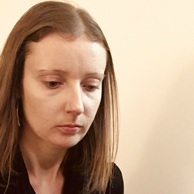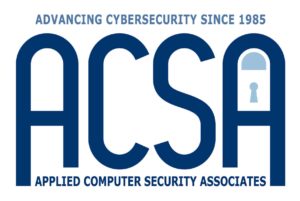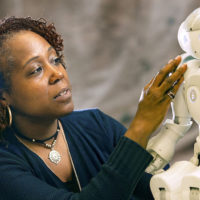SWSIS Scholarships: Where are They Now? Featured Scholar: Jill Jermyn
SWSIS (Scholarships for Women Studying Information Security) provides scholarships of up to $10,000 for women studying for their bachelor’s and master’s degrees in fields relating to information security. SWSIS is a partnership of Applied Computer Security Associates (ACSA) and CRA-W, with sponsorship from ACSA, Hewlett Packard Enterprise and Symantec.

Jill Jermyn was the first recipient of a SWSIS Scholarship in 2012. SWSIS funds supported her Masters’ degree at Columbia University, after which she transitioned into a Ph.D. program. SWSIS does not currently fund Ph.D. studies. Jill is a Software Engineer in Security and Privacy at Google. She recently received her Ph.D. from Columbia University, where her research focused on networking and security.
By Jill Jermyn
 Five years after having been awarded the SWSIS scholarship, I feel more grateful than ever to have had the honor and support of this award. I was selected during a period that was difficult and uncertain for me. Just a short while before, I had taken a very bold decision to change my career from a classical violinist to something completely unrelated and foreign to me: cybersecurity. I was particularly appreciative of receiving the SWSIS scholarship at the time because I had just enrolled in graduate school in Computer Science at Columbia. I had very little background in engineering but was extremely motivated by an insatiable desire to expand my mind and fulfill my curiosities. Although my motivations were strong, I faced quite a bit of adversity in my professional and personal life due to the career change, and the SWSIS scholarship really provided a great deal of encouragement for me during that difficult time. Moreover, it provided me with the means to pursue my Ph.D. in cybersecurity, an experience that has changed my life in so many ways and for which I am grateful. I am now working as a Software Engineer at Google, where I work on system security in the Data Protection Core Infrastructure group in New York City.
Five years after having been awarded the SWSIS scholarship, I feel more grateful than ever to have had the honor and support of this award. I was selected during a period that was difficult and uncertain for me. Just a short while before, I had taken a very bold decision to change my career from a classical violinist to something completely unrelated and foreign to me: cybersecurity. I was particularly appreciative of receiving the SWSIS scholarship at the time because I had just enrolled in graduate school in Computer Science at Columbia. I had very little background in engineering but was extremely motivated by an insatiable desire to expand my mind and fulfill my curiosities. Although my motivations were strong, I faced quite a bit of adversity in my professional and personal life due to the career change, and the SWSIS scholarship really provided a great deal of encouragement for me during that difficult time. Moreover, it provided me with the means to pursue my Ph.D. in cybersecurity, an experience that has changed my life in so many ways and for which I am grateful. I am now working as a Software Engineer at Google, where I work on system security in the Data Protection Core Infrastructure group in New York City.
To anyone interested in the field of cybersecurity, I would strongly recommend pursuing graduate studies. Technology is moving so rapidly that it opens up many avenues for vulnerabilities and hence many opportunities for security research in a constantly changing landscape. Inspired by my internships in networking and security at AT&T, Microsoft, and IBM, I chose to study ways in which we can discover vulnerabilities in evolving networks for my thesis topic. Now that I am working full time in industry, I have come to realize that I have taken away many other skills and experiences from my time in graduate school in addition to becoming a successful security researcher. There are two skills that stand out, and oddly these are among the most important skills that I have also taken away from my previous career, although in vastly different contexts. First is the ability to deeply think about and concentrate on a single problem for a long period of time. I find that in our society today there is a tendency to move too quickly among ideas and problems. It’s not always possible or practical to thoroughly expand every idea or deeply study every problem, but having the chance to do so expands one’s mind exponentially and truly impacts the way in which one approaches subsequent problems. I first learned to deeply study and concentrate on minute details as a musician, spending years on a single concept. Although the concepts were different in Computer Science, I found a very similar experience when working on my thesis and I very much value having had this opportunity from two different viewpoints.

The second skill that I highly value is the ability to defend one’s ideas, and I refer to this skill in various forms. During my PhD, I learned how to defend my work and my ideas because they were constantly being questioned and criticized by experts in the field. Although it can be frustrating and difficult in the short term, the long-term benefits are invaluable. Not only does one learn to think quickly and present oneself with extreme self-assurance when being questioned, one also learns to think like an experienced researcher. Knowing how to defend and question ideas in turn helps one to become better at approaching problems from a variety of angles.
Not only do I find that having these two skills makes people successful in the field of cybersecurity, I also find them essential for expanding directions of the field in years to come. The fast-paced environment of the technology field has created a great need for experts in cybersecurity, but in order to come up with more robust and innovative solutions to problems, we need people from all different backgrounds and vantage points. The longer I spend working in cybersecurity, the more I realize how important that is. For this reason, I am particularly appreciative of the SWSIS scholarship and its vision. I would highly encourage people from all backgrounds to consider a career in cybersecurity, absolutely regardless of where you are coming from. Only a few years ago, I was playing concerts and practicing the violin. I would have never imagined becoming a PhD in Computer Science and engineer at Google. In my case, it started only with some curiosity and fearlessness. For others thinking about taking the risk of diving into cybersecurity, I can assure you that you will find a very rewarding experience.





